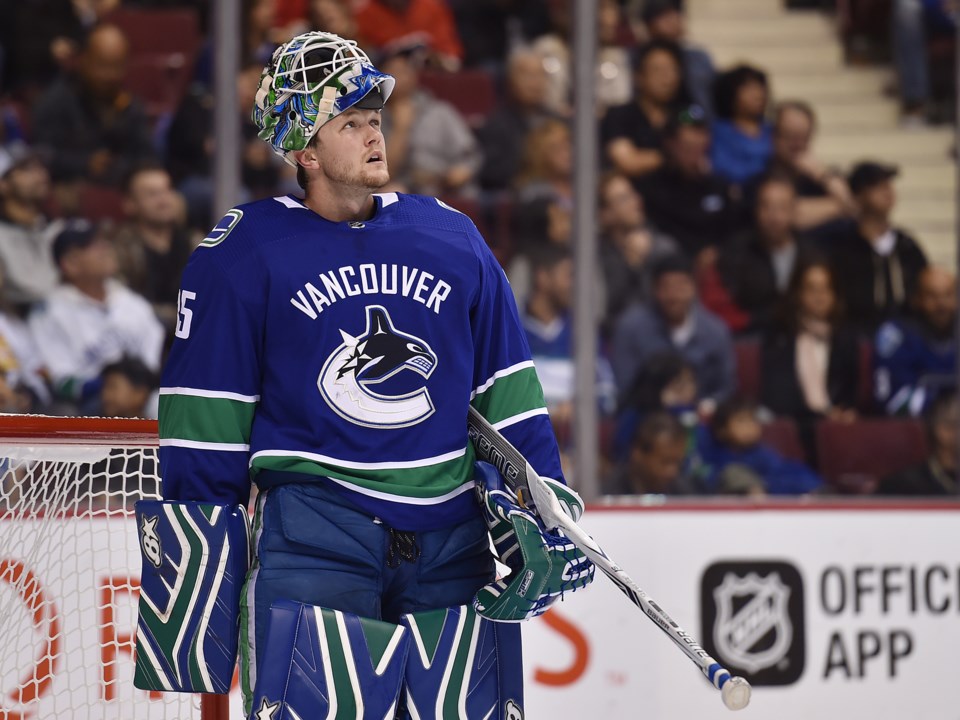The Canucks have quite a few restricted free agents to re-sign this off-season. The key re-signing will be Brock Boeser, but Thatcher Demko is not far behind in terms of importance. At least, he will be if he becomes the number one goaltender that the Canucks hope he can be.
So, it’s nice that Canucks’ GM Jim Benning got that contract out of the way early, re-signing Demko on Wednesday to a two-year deal.
The contract has an average annual value (AAV) of $1.05 million and he will still be a restricted free agent (RFA) at the end of the deal. That gives Demko a couple years to prove himself at the NHL level, as he’s expected to be the full-time backup to Jacob Markstrom next season and could have a chance to take the starting job for himself by the second year.
Some corners of the Canucks’ fanbase were quick to call the contract a steal, but it’s not. Neither is it an egregious overpayment. It’s right around what you might expect for a highly-touted young goaltender with just 10 games of NHL experience under his belt. It’s a fine contract, neither extremely good nor extremely bad.
Let’s look at a few comparable contracts in recent years: players either coming off their entry-level contracts (ELC) or off a one-year extensions after their ELC, between 22 and 24 years old, with a similar number of games played. I used Cap Friendly’s similarity tool, as well as some statistics from the NHL, to put together this list:
The goaltenders are sorted in order of Cap Hit Percentage: what percentage of their team’s cap hit was taken up by their contracts at the time. That way, we can compare Demko’s contract a bit more accurately to those signed from past years when the salary cap was a little lower.
The big outlier here is Matt Murray, who signed a three-year extension worth $3.75 million per year at 22 after just 13 regular season games. The difference, of course, is that not only was Murray fantastic in those 13 games, posting a .930 save percentage, he went on to play 21 playoff games. He posted a .923 save percentage and won the Stanley Cup.
That’s what you might call a “mitigating circumstance.”
Right around Demko’s contract, we find some pretty similar players: young goaltenders that were expected to play a big role in the future of their respective franchises, like Calvin Pickard, Jake Allen, and Joonas Korpisalo.
Demko was a second-round pick, as were Pickard and Allen, while Korpisalo was a third-round pick. Pickard and Allen were AHL starters for three full season prior to their contract extension, as was Demko, while Korpisalo played parts of two seasons in the AHL after coming over from Finland.
You can see the similarities, though Pickard was better in his NHL stints, as was Korpisalo. Allen, however, has had the most success since, becoming the starter for the St. Louis Blues, though he was supplanted by rookie Jordan Binnington this season.
Demko’s contract falls right in line with Pickard, Allen, and Korpisalo, but there are some other contracts that suggest the Canucks might have overpaid a little.
Philipp Grubauer is an interesting comparable. Grubauer was a fourth-round pick of the Washington Capitals in 2010 and played his first NHL games just a couple seasons later. He became the starter in the AHL and was expected to be the backup in the NHL the season after signing his contract extension.
In that way, he was very similar to Demko, but Grubauer had played twice as many games, with an impressive .924 save percentage, albeit for a strong Capitals team. Getting him signed to a two-year deal worth $750,000 per year seems like a bit of a steal.
The difference is that Grubauer had a still-young Braden Holtby blocking his progress in Washington, while Demko has the slightly older Jacob Markstrom ahead of him. There wasn’t really a path to becoming a starter for Grubauer, while Demko could be the starter in two years’ time. Perhaps that’s why Grubauer couldn’t command a more capacious cap hit.
Grubauer has since found a starting job with the Colorado Avalanche after a trade and was outstanding in their first-round series with the Calgary Flames, posting a .939 save percentage in five games.
The comparable that looks the worst in terms of contract value is Tristan Jarry, whose body of work at the time of his extension looks pretty similar to that of Demko. He was even a second-round pick, like Demko. He re-signed at near league minimum for two years. Of course, the Canucks are likely a lot higher on Demko than the Pittsburgh Penguins were on Jarry, who lost the backup job the following season to Casey DeSmith, though a strong AHL season could find him back in the NHL soon.
Demko seemed to be trending upwards as the season progressed, finishing with a .913 save percentage after some early struggles, though he dismissed the numbers at the end of the season.
“Stats are for you guys,” said Demko with a smile at the end-of-year media availability. “It doesn’t matter to me.”
Now that the deal is done, Demko’s contract is likely another number that doesn’t matter to him. For Canucks fans, however, they’re hoping Demko’s performance over the next two years makes that number look far too small.



